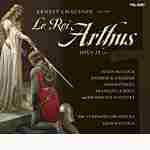
Le Roi Arthus (Complete opera)
 $78.29
Out of Stock
$78.29
Out of Stock6+ weeks add to cart
CHAUSSON
Le Roi Arthus (Complete opera)
Andrew Schroeder (baritone) Susan Bullock (soprano) Simon O'Neill (tenor) Donald McIntyre (bass-baritone) / BBC Symphony Orchestra / Leon Botstein
[ Telarc Records / 3 CD ]
Release Date: Sunday 24 July 2005
This item is currently out of stock. It may take 6 or more weeks to obtain from when you place your order as this is a specialist product.
"Romance and giddy grandeur - a French vision of Camelot"
(Gramophone)
Editor's Choice Award from Gramophone Magazine
"What a treat! Chausson's heady opera of 1903 which focuses on the illicit love of Lancelot and Guinevere drinks deeply of the well of Wagner's Tristan und Isolde. The themes are similar, the desire for love and death intertwined more than echoing Wagner's preoccuptaions, but the work is sufficiently French to set it apart. Superbly led by Leon Botstein, the huge forces give the heady score their all."
(Gramophone)
Leon Botstein returns with another rarely heard opera jewel. Chausson's Le Roi Arthus on Telarc features Andrew Schroeder as Arthus, Susan Bullock as Genièvre, Simon O'Neill as Lancelot, François Le Roux as Merlin and the Apollo Voices under the leadership of chorus master Stephen Betteridge.
Hardly an unknown composer, Ernest Chausson (1855-1899) is mainly known for his smaller works—vocal and chamber music, or sometimes a combination of the two. He will always be prized by those who love Debussy, Fauré, Duparc and Ravel. Indeed his Poème de l'amour et de la mer and the Concerto for piano, violin and string quartet stand apart from the work of his major contemporaries, and in some respects surpass it.
Chausson labored on Le Roi Arthus for more than a decade and shared the work with his friend, Claude Debussy, who eagerly listened and liberally dispensed advice. Debussy even worked an allusion to Chausson's project into the fabric of Pelléas et Mélisande.
"If the beginning of Chausson's second act sounds vaguely familiar to some listeners today, it will be because of shared material with the third act of Debussy's better-known work: common tonality and musical motif, similar performance indication (calme in one, doux et calme in the other), and dramaturgical progression from sung legend (with modal musical color) to scene for the lovers," according to the liner notes by Steven Huebner, associate professor of music at McGill University in Montreal. "With its principal motif cast unchanged against different orchestral and harmonic colors, Chausson's scene-setting music in Act II is one of the most 'impressionistic' moments of his opera. But Debussy was not entirely approving. His more general criticism of Chausson's symphonic approach in Le Roi Arthus parallels his own reticence to use such textures in Pelléas."
"An admirer of Celtic literature as well as of Wagner, [Chausson] wrote his own skillful text in prose and verse on King Arthur's renunciation of life in the wake of Guinevere's betrayal of his love with Lancelot," according to the Oxford Concise Dictionary of Opera. "The work makes a discreet and individual motive, and is eloquently scored; but the influence of Wagner is intelligently and discreetly applied, and comparisons with Tristan are not really appropriate."
"Chausson's considerable wealth left him free to spend his time as he wished, and he was a generous benefactor of less fortunate artists and musicians, including Debussy," according to scholar and poet John Ashbery, professor of languages and literature at Bard College (who penned additional liner notes for the Telarc recording). "His married life was idyllic and produced five children, but he was also restless and even tormented, uncertain of his talent and (in his early twenties) of which branch of the arts to pursue." Chausson was a talented draftsman and author and even wrote his own libretto to Le Roi Arthus. Unfortunately, Arthus is his only opera; he died at the early age of 44 in a bicycle accident."
Leon Botstein is the Music Director of the Jerusalem Symphony Orchestra and of the American Symphony Orchestra in New York. He is also Artistic Director of the Bard Music Festival and of the American Russian Young Artists Orchestra. His most recent recording of Popov's Symphony No. 1 and Shostakovich's Themes and Variations, Op. 3, with the London Symphony Orchestra received great praise from audiophiles. The Absolute Sound said "Telarc's recording is splendiferous: stunning in its presence, timbral fidelity, earth-shaking dynamics, and miraculous transparency even as the orchestra unleashes tectonic forces."
Other Botstein recordings with the London Symphony include Liszt's Dante Symphony and Tasso; as well as Gliere's Symphony No. 3 "Il'ya Murometz." With the American Symphony Orchestra he recorded live performances of Strauss' Die ägyptische Helena with Deborah Voigt, and Die Liebe der Danae with Laura Flanagan. Botstein will make his New York City Opera debut in the Fall of 2005 in a new production of Paul Dukas' Ariane et Barbe-bleue, a setting of the Bluebeard myth.
The Chausson recording was produced in association with the BBC Symphony Orchestra and BBC Radio 3.
